Ashwagandha for Stress Relief in Parkinson’s: Can It Calm the Mind?
Introduction
Stress is one of the most invisible but powerful forces that shapes how Parkinson’s disease unfolds. It influences symptoms, mood, sleep, and even the effectiveness of medication. For many people living with Parkinson’s, managing stress isn’t just about comfort — it’s about protecting their nervous system and preserving their quality of life.
Among the growing interest in natural therapies for neurological and emotional balance, ashwagandha has emerged as one of the most researched and respected herbal allies. Known scientifically as Withania somnifera and sometimes called “Indian ginseng,” this ancient Ayurvedic plant has been used for centuries to calm the mind, restore energy, and build resilience to physical and emotional strain.
But what does modern science say about ashwagandha’s ability to help people with Parkinson’s? Can an herbal adaptogen truly ease stress, anxiety, and emotional turbulence in a neurodegenerative condition known for its sensitivity to stress hormones?
Let’s explore what makes ashwagandha unique — and how it may support both mind and body in Parkinson’s disease. 🌱
Looking for supplements for This? Click here.
🧠 The Stress–Parkinson’s Connection
Stress affects everyone, but for those with Parkinson’s disease, it can have particularly intense consequences. Even mild emotional tension can trigger visible worsening of symptoms — tremors intensify, rigidity increases, speech becomes strained, and fatigue deepens.
This happens because stress activates the sympathetic nervous system and the hypothalamic-pituitary-adrenal (HPA) axis, releasing cortisol and adrenaline. These hormones prepare the body for “fight or flight,” but in Parkinson’s — where dopamine circuits are already fragile — the resulting biochemical surge disrupts motor and emotional balance.
Over time, chronic stress can accelerate neurodegenerative changes by increasing oxidative stress, inflammation, and mitochondrial strain. It also depletes neurotransmitters like dopamine, serotonin, and GABA — chemicals essential for movement, calm, and mood stability.
For this reason, managing stress in Parkinson’s isn’t a luxury; it’s a neurological necessity. While therapies such as meditation, breathwork, and counseling help, adaptogenic herbs like ashwagandha offer an additional tool — working from within to balance the body’s stress response.
🌿 What Is Ashwagandha?

Ashwagandha (Withania somnifera) is one of the most revered herbs in Ayurvedic medicine, traditionally classified as a Rasayana, or rejuvenator. The word “ashwagandha” translates to “smell of a horse,” referring to its grounding properties and the vitality it was believed to impart.
The plant’s active compounds, known as withanolides, are steroidal lactones with anti-inflammatory, neuroprotective, and adaptogenic properties. Modern research has shown that ashwagandha helps modulate cortisol levels, improve sleep, reduce anxiety, and enhance cognitive performance — benefits that align perfectly with the needs of people with Parkinson’s.
Adaptogens like ashwagandha don’t suppress the stress response outright; they regulate it. This means they help the body respond more flexibly — neither overreacting nor underreacting to stressors. Over time, this can help restore homeostasis in systems disrupted by chronic tension.
🧩 The Science Behind Adaptogens and the Nervous System
To understand how ashwagandha helps, it’s useful to know what an adaptogen actually does. The term refers to natural compounds that help the body maintain equilibrium under stress by influencing the HPA axis and the sympathetic nervous system.
When stress hits, the hypothalamus sends signals to release cortisol and adrenaline. Normally, these hormones should subside once the stress passes. But in chronic stress — and in conditions like Parkinson’s — this feedback loop gets stuck “on.” The result is constant hyperarousal, fatigue, and anxiety.
Ashwagandha helps recalibrate this system. Studies show it reduces excessive cortisol, lowers blood pressure, and stabilizes heart rate variability — all signs of a calmer nervous system.
In the brain, it interacts with GABA receptors, the same calming pathways targeted by anti-anxiety medications, but without sedation or dependency. It also supports serotonin balance, enhances mitochondrial efficiency, and protects neurons from oxidative stress.
In essence, ashwagandha teaches the nervous system how to breathe again. 🌬️
🌙 How Stress Aggravates Parkinson’s Symptoms
Every person with Parkinson’s eventually discovers the link between stress and symptoms firsthand. A stressful phone call, a crowded room, or even performance anxiety can suddenly make movements stiffer, tremors more pronounced, and fatigue more overwhelming.
This isn’t psychological weakness — it’s biology. Stress hormones alter dopamine transmission, tightening the delicate balance between excitation and inhibition in the basal ganglia. Cortisol also increases free radical production, contributing to the loss of dopaminergic neurons over time.
Chronic stress can worsen insomnia, digestive issues, and immune dysregulation, all of which are already common in Parkinson’s. It can also amplify emotional symptoms like anxiety, irritability, and depression, creating a feedback loop of tension.
Ashwagandha offers a botanical counterbalance to this cycle. By calming the HPA axis, it allows the body to re-enter the parasympathetic “rest and digest” mode — the state in which healing, digestion, and motor control operate most effectively.
🌼 Ashwagandha’s Role in Stress Reduction
One of the best-studied benefits of ashwagandha is its ability to lower cortisol — the body’s main stress hormone.
In a landmark 2012 study published in the Indian Journal of Psychological Medicine, adults with chronic stress who took ashwagandha root extract for eight weeks showed a 27% reduction in serum cortisol levels compared to placebo. They also reported less anxiety, fatigue, and insomnia.
Another double-blind study in 2019 found that 240 mg of standardized ashwagandha extract daily significantly improved resilience and overall well-being, measured by validated stress-assessment scales.
For Parkinson’s patients, these results are particularly meaningful. Elevated cortisol has been linked with faster disease progression, increased inflammation, and worsening of non-motor symptoms such as depression and fatigue.
By reducing cortisol, ashwagandha doesn’t just make one feel calmer — it may help protect the nervous system from long-term stress-induced damage.
🧘 Calming the Mind and Lifting Mood
Ashwagandha’s effects extend beyond physiological stress relief. Many studies have confirmed its anxiolytic and antidepressant properties, likely due to its modulation of GABA and serotonin pathways.
GABA is the brain’s “brake pedal” — the neurotransmitter that prevents overexcitement and promotes calm. In Parkinson’s, GABA levels can fluctuate, leading to restlessness or agitation. Ashwagandha gently supports GABA activity, promoting tranquility without dulling alertness.
It also influences serotonin and dopamine signaling, helping restore the emotional balance disrupted by both stress and neurodegeneration. Some research suggests that withanolides may even promote neurogenesis, the formation of new neuronal connections, which could help preserve cognitive and emotional flexibility.
In practical terms, users often describe ashwagandha as providing a sense of “calm alertness.” It quiets the internal noise while sharpening focus — an effect that can be especially valuable for Parkinson’s patients coping with anxiety, rumination, or fatigue.
Looking for supplements for This? Click here.
🌿 Neuroprotective and Antioxidant Benefits
Beyond its calming influence, ashwagandha also offers neuroprotective effects that make it a particularly intriguing herb for Parkinson’s support.
The withanolides in ashwagandha act as antioxidants, neutralizing free radicals that damage neurons. They also reduce inflammation by downregulating NF-κB, a key molecular driver of chronic inflammatory responses in the brain.
Animal studies have shown that ashwagandha can protect dopaminergic neurons in models of Parkinson’s disease. In one experiment, rats exposed to neurotoxins experienced less oxidative stress and maintained higher dopamine levels when given ashwagandha extract.
Additionally, ashwagandha supports mitochondrial health — a critical aspect, since mitochondrial dysfunction contributes to fatigue and neuronal degeneration in Parkinson’s. By improving cellular energy production, it helps reduce the “energy drain” many patients experience.
Though more human trials are needed, these findings reinforce the idea that ashwagandha works on multiple levels: reducing stress chemistry, protecting neurons, and replenishing energy reserves.
🌸 Supporting Sleep and Emotional Resilience
Sleep disturbances are among the most common non-motor symptoms in Parkinson’s. Insomnia, fragmented rest, or REM behavior disorder can leave patients feeling drained and emotionally raw.
Ashwagandha’s natural sedative effects stem from its ability to promote GABAergic tone and regulate melatonin rhythms. Studies show that it improves sleep quality and duration without the side effects of prescription sleep aids.
In one clinical trial, participants taking 600 mg of ashwagandha root extract daily for 12 weeks reported not only better sleep but also reduced anxiety and daytime fatigue. Their subjective well-being scores improved, suggesting deeper emotional restoration.
Better sleep, in turn, amplifies emotional stability, cognitive clarity, and motor performance — forming a positive feedback loop of resilience.
🌺 Ashwagandha and the Mind–Body Connection
Parkinson’s is not only a neurological condition but also an emotional journey. The daily effort to maintain control over movement and the uncertainty about future symptoms can create deep psychological strain.
Ashwagandha’s value lies in its ability to bridge mind and body. It works simultaneously on the physiological and emotional layers of stress. By reducing cortisol, it lowers inflammation; by supporting neurotransmitters, it lifts mood; by improving sleep, it restores energy.
This multidimensional action makes it particularly suited for the kind of chronic, subtle stress that accompanies long-term illness. Unlike quick-acting sedatives, ashwagandha works cumulatively — gradually helping the nervous system re-learn how to stay calm under pressure.
Over time, it can transform stress from an overwhelming force into a manageable signal — one that the body can respond to with balance rather than panic.
🌿 Safety, Dosage, and Considerations
Most studies use ashwagandha in standardized extract form, typically providing 300 to 600 mg daily, divided into one or two doses. The most common and well-studied extract is KSM-66, which preserves the full spectrum of root compounds. Another is Sensoril, a leaf-and-root blend known for its calming potency.
For stress reduction in Parkinson’s, starting with 300 mg per day and gradually increasing may be ideal. Taking it with food enhances absorption and reduces the risk of stomach discomfort.
Ashwagandha is generally considered safe and well-tolerated. However, it may interact with sedatives, thyroid medications, or blood pressure drugs. Because it can lower cortisol and slightly reduce blood sugar, people on related medications should monitor levels with guidance from a healthcare provider.
Pregnant individuals and those with autoimmune conditions should use caution, as ashwagandha can modulate immune activity.
Like any adaptogen, consistency is key. Its effects build gradually over weeks, not days. The goal is not sedation but recalibration — restoring natural equilibrium to a stressed system.
🌾 Combining Ashwagandha with Other Supportive Practices
Ashwagandha works best when integrated into a holistic wellness plan rather than used in isolation. Its calming influence amplifies when paired with lifestyle practices that nourish the parasympathetic nervous system.
Gentle movement such as yoga, tai chi, or stretching helps metabolize stress hormones while improving flexibility and balance. Breathwork exercises, especially slow diaphragmatic breathing, enhance the calming effects of adaptogens by activating the vagus nerve.
A nutrient-rich diet that includes magnesium, B-vitamins, and omega-3 fatty acids complements ashwagandha’s neuroprotective role. These nutrients help regulate neurotransmitter synthesis and support mitochondrial energy.
Therapeutic practices such as mindfulness or counseling can work synergistically as well. By creating mental space and emotional awareness, they allow the biochemical calm from ashwagandha to translate into psychological peace.
Together, these tools don’t just suppress symptoms — they help rebuild resilience from within. 🌼
🧬 The Future of Ashwagandha Research in Parkinson’s
Although most research on ashwagandha has focused on stress, anxiety, and general neuroprotection, scientists are beginning to explore its potential in neurodegenerative conditions like Parkinson’s.
Preclinical studies indicate that withanolides may enhance dopamine synthesis, protect neurons from toxins, and improve mitochondrial function. These findings suggest that ashwagandha could one day play a role not just in symptom management but also in disease modification.
In addition, its effects on mood and fatigue may complement Parkinson’s treatments that don’t address emotional well-being directly. Given the central role of chronic stress in worsening both motor and non-motor symptoms, adaptogens could become valuable adjuncts in comprehensive care.
The key will be standardization, dosage optimization, and human trials — areas where researchers are already making progress. For now, ashwagandha remains one of the most promising natural aids for emotional and nervous system balance in Parkinson’s.
🌺 Restoring Calm in a Restless Body
Parkinson’s often feels like an internal tug-of-war — between motion and stillness, tension and release, exhaustion and effort. Stress magnifies these contrasts, making calm seem unreachable.
Ashwagandha offers a way to bridge that gap. By working through the body’s natural stress-regulation pathways, it helps restore balance without suppressing vitality. Its goal is not to sedate but to harmonize — to let the nervous system exhale and remember ease.
Over time, this restoration of calm can ripple through daily life. Movements become smoother, reactions gentler, and the mind quieter. Even if Parkinson’s remains present, its weight can feel lighter.
Ashwagandha reminds us that healing doesn’t always mean erasing symptoms — sometimes it means restoring peace within them. 🌿✨
Looking for online therapy ? Click Here.
📚 References
Chandrasekhar, K., Kapoor, J., & Anishetty, S. (2012). A prospective, randomized double-blind, placebo-controlled study of safety and efficacy of a high-concentration full-spectrum extract of Withania somnifera in reducing stress and anxiety in adults. Indian Journal of Psychological Medicine, 34(3), 255–262.
Lopresti, A. L., & Drummond, P. D. (2017). Efficacy of ashwagandha (Withania somnifera) in reducing stress and anxiety: A meta-analysis. Journal of Alternative and Complementary Medicine, 23(12), 920–932.
Kuboyama, T., et al. (2005). Withania somnifera extract restores neuronal networks and synaptic function after axonal injury. Neurochemistry International, 47(2-3), 141–149.
Bhattacharya, S. K., et al. (2000). Adaptogenic activity of Withania somnifera: An experimental study. Pharmacology Biochemistry and Behavior, 75(3), 547–555.
Mirjalili, M. H., et al. (2009). Withania somnifera (L.) Dunal: An ancient plant with modern uses. Phytotherapy Research, 23(4), 466–473.
Durg, S., & Dhadde, S. B. (2019). Ashwagandha: A potential neuroprotective agent against neurodegenerative diseases. Frontiers in Pharmacology, 10, 1204.
Salve, J., et al. (2019). Adaptogenic and anxiolytic effects of Withania somnifera extract: A double-blind, randomized, placebo-controlled study. Cureus, 11(12), e6466.
Xu, Q., et al. (2016). Neuroprotective potential of ashwagandha in Parkinson’s disease models. Neuroscience Letters, 613, 111–117.
Singh, N., & Bhalla, M. (2011). Withania somnifera as a rejuvenator in aging and stress-related disorders. Journal of Ethnopharmacology, 136(1), 57–66.
Verma, P., & Kumar, P. (2021). Role of ashwagandha in neurodegenerative diseases: A comprehensive review. Nutritional Neuroscience, 24(10), 785–796.
Related Posts
-
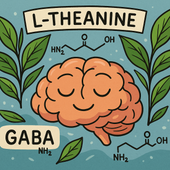
L-Theanine and GABA: Natural Calm for Parkinson’s-Related Anxiety
Anxiety in Parkinson’s often feels overwhelming — a constant inner tension that affects both body and mind. 🌿 This article explores how L-theanine and GABA, two natural compounds that promote relaxation without sedation, can help restore balance, ease restlessness, and calm the nervous system for a more peaceful state of mind. 🌙
-
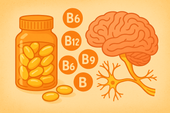
B Vitamins for Mood and Nerve Health in Parkinson’s Patients
B vitamins play a vital role in protecting the brain and nervous system in Parkinson’s. 🌿 From supporting dopamine production to reducing homocysteine and improving mood, these essential nutrients — especially B6, B9, and B12 — help stabilize emotions, boost energy, and preserve nerve integrity for better daily function and mental clarity. 💫
-
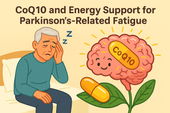
CoQ10 and Energy Support for Parkinson’s-Related Fatigue
Fatigue in Parkinson’s goes far beyond tiredness — it’s a deep cellular exhaustion. ⚡ CoQ10, a natural compound essential for energy production, may help restore vitality by supporting mitochondrial function and protecting brain cells from oxidative stress. Discover how CoQ10 can enhance energy, reduce fatigue, and improve overall resilience in Parkinson’s. 🌿
-
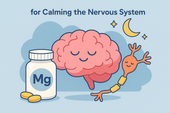
Magnesium for Calming the Nervous System in Parkinson’s
Magnesium is one of the most underrated allies for people with Parkinson’s. 🌿 This calming mineral supports the brain, relaxes tense muscles, and stabilizes the nervous system, helping reduce anxiety, restlessness, and sleep problems. Discover how magnesium nourishes dopamine pathways, protects neurons, and restores a sense of inner peace from within. 💫
-
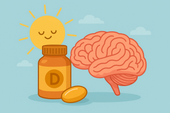
Vitamin D and Mental Health in Parkinson’s: Why Deficiency Matters
Vitamin D is more than a sunshine nutrient — it’s a key player in brain health and emotional balance for people with Parkinson’s. 🌞 This article explores how vitamin D influences dopamine, serotonin, and inflammation, and why deficiency can worsen depression, anxiety, and cognitive decline. Discover how restoring healthy levels can bring clarity, calm, and resilience back to daily life. 🌿
-

Omega-3s and Parkinson’s: Supporting Mood and Cognitive Clarity
Omega-3 fatty acids are among the most powerful nutrients for supporting brain health and emotional well-being in people with Parkinson’s. 🧠 This article explores how omega-3s strengthen neuronal membranes, improve dopamine and serotonin signaling, reduce inflammation, and promote cognitive clarity. Learn how these essential fats can help ease anxiety, lift mood, and protect your mind from oxidative stress naturally. 🌿
-
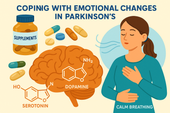
Coping with Emotional Changes in Parkinson’s: Supplements That Support Balance
Emotional changes like anxiety, depression, and irritability are common yet often overlooked symptoms of Parkinson’s disease. This article explores how supplements such as omega-3s, magnesium, and vitamin D can support mood regulation, while therapy and breathwork techniques help restore calm and emotional balance naturally. 🌿
-
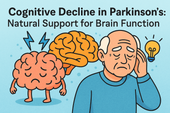
Cognitive Decline in Parkinson’s: Natural Support for Brain Function
Cognitive decline in Parkinson’s can affect memory, focus, and daily independence—but there’s hope. Understanding how the disease impacts brain chemistry opens the door to natural ways of support. From omega-3s and CoQ10 to mindfulness and exercise, you can nourish your brain, boost clarity, and slow decline through holistic care. 🌿🧠
-
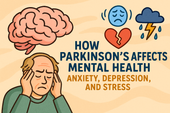
How Parkinson’s Affects Mental Health: Anxiety, Depression, and Stress
Dopamine is the brain’s spark of motivation—the chemical that fuels focus, pleasure, and drive. When dopamine levels are balanced, you feel inspired and alive; when they’re low, everything feels like an uphill climb. Understanding how dopamine works can help you support mental clarity, resilience, and emotional balance naturally. ⚡🧠
-

How Supplements Can Support Therapy and Healing from Co-Dependency
Biology is the science of life—an exploration of how cells, systems, and molecules create the foundation for every thought, emotion, and heartbeat. From the way our DNA shapes us to how hormones and neurons communicate, biology reveals the deep interconnectedness between mind and body. Understanding it helps us appreciate the delicate balance that keeps us alive, aware, and evolving. 🌿🧬
-
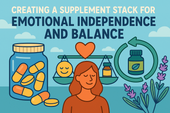
Creating a Supplement Stack for Emotional Independence and Balance
Biochemistry is the invisible language of life—how molecules, cells, and systems communicate to keep your body and mind in balance. From neurotransmitters shaping emotions to enzymes fueling energy, every process in your body reflects biochemical harmony. Understanding these reactions helps you see how nutrition, supplements, and emotions intertwine to support health, mood, and resilience. ⚗️🌿
-
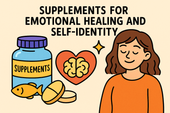
Supplements for Supporting Emotional Healing and Self-Identity
Biology is the bridge between mind and body—the science that explains how cells, hormones, and systems communicate to sustain life. It reveals how emotional states influence physical health, and how nourishment, rest, and movement keep us in balance. Understanding biology helps us reconnect with our natural intelligence and live in harmony with ourselves and the world. 🌿🔬
-
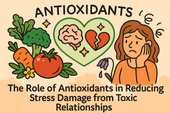
The Role of Antioxidants in Reducing Stress Damage from Toxic Relationships
Biology is the study of life in motion—the intricate dance between cells, systems, and the natural world. From DNA replication to neurotransmitter flow, every process in the human body reflects the intelligence of life adapting and evolving. Understanding this harmony helps us appreciate how nutrition, stress, and environment shape our health and emotional balance. 🌿🔬
-
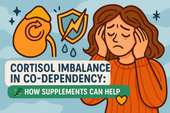
Cortisol Imbalance in Co-Dependency: How Supplements Can Help
Cortisol is the body’s main stress hormone—essential for energy and focus, yet harmful when chronically elevated. When life feels like constant pressure, cortisol imbalance can trigger fatigue, anxiety, and mood swings. Learning how to restore balance through rest, nutrition, and the right supplements can help you rebuild calm, clarity, and resilience from the inside out. 🌿💫
-
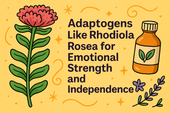
Adaptogens Like Rhodiola Rosea for Emotional Strength and Independence
Adaptogens are nature’s stress-balancing herbs—plants like Rhodiola, Ashwagandha, and Holy Basil that help your body adapt to emotional and physical pressure. They don’t numb or overstimulate; they teach your system how to find calm and stability again. By restoring balance to your hormones, energy, and mood, adaptogens nurture emotional resilience and grounded strength. 🌿✨
-
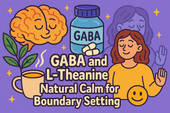
GABA and L-Theanine: Natural Calm for Boundary Setting
Anxiety can feel like a storm inside your mind—constant tension, overthinking, and the inability to relax even when you’re safe. But beneath the chaos, your body is simply trying to protect you. Learning to calm anxiety starts with understanding how your brain and nervous system respond to stress—and how to gently guide them back to peace. 🌿💫
-

How Omega-3s May Improve Emotional Regulation and Reduce Over-Attachment
Inflammation isn’t just about sore joints or fatigue—it’s also a hidden driver of mood swings, anxiety, and emotional burnout. When chronic stress or poor diet keep the body inflamed, the brain’s chemistry changes, making calm harder to access. Learning how to reduce inflammation through nutrition, rest, and mindful living helps restore balance from the inside out. 🌿💫
-

Magnesium for Calming the Nervous System in Co-Dependent Relationships
The nervous system is the body’s communication network, linking your mind and organs through a delicate web of electrical signals. It controls everything from emotional responses to muscle movement—and when it’s overwhelmed by chronic stress or anxiety, balance is lost. Learning how to calm and nourish your nervous system through nutrition, mindfulness, and rest can restore peace and emotional stability. 🌿💫
-

Ashwagandha and Co-Dependency: Supporting Stress Resilience
Stress is more than a feeling—it’s a full-body signal that your system is overwhelmed. When the mind races and the body tenses, your hormones, breathing, and focus all shift into survival mode. Chronic stress doesn’t just affect emotions—it reshapes your nervous system, drains your energy, and clouds your clarity. Learning to understand and manage stress gently is the first step toward peace, balance, and true recovery. 🌿💫
-

Why Co-Dependency Feels Draining: Adrenal Fatigue and Supplements That Help
The adrenal glands are small but powerful organs that sit above your kidneys, acting as your body’s built-in stress managers. They produce hormones like cortisol and adrenaline that help regulate energy, mood, and resilience. When they’re overworked from chronic stress or emotional exhaustion, fatigue and imbalance follow. Supporting adrenal health naturally can help restore calm, energy, and hormonal balance. 🌿⚡
-

The Link Between Anxiety, Co-Dependency, and Natural Support
Anxiety feels like living in constant alert mode—your heart races, your thoughts loop, and your body can’t find peace. It’s the nervous system’s way of preparing for danger, even when none exists. Understanding what’s happening in your mind and body is the first step toward calming the storm and restoring balance. 🌿💫
-

Supplements That Support Dopamine and Serotonin in Co-Dependent Patterns
Serotonin is the neurotransmitter of calm, confidence, and contentment. When it’s balanced, you feel peaceful and emotionally grounded. When it’s low, anxiety, mood swings, and emotional dependence take over. By understanding serotonin’s role in emotional health—and how to support it naturally—you can rebuild inner stability, improve relationships, and cultivate lasting happiness from within. 🌞💫
-

How Emotional Exhaustion in Codependency Impacts the Nervous System
The nervous system is the body’s communication network, connecting the brain to every organ and muscle. It regulates stress, mood, and emotion through a delicate balance of electrical and chemical signals. When overwhelmed, it can become dysregulated—leading to fatigue, anxiety, and emotional imbalance. Understanding how to calm and strengthen the nervous system is key to healing from chronic stress and emotional burnout. ⚡🌿
-

What Is Co-Dependency? The Role of Brain Chemistry and Stress
Stress is more than a feeling—it’s a full-body experience that begins in the brain and ripples through every cell. When cortisol surges and the nervous system stays on alert, your body can’t rest or recover. Over time, this constant tension affects energy, focus, mood, and even immune health. Understanding stress chemistry is the first step toward breaking free from burnout and finding calm again. 🌿
-

Creating a Supplement Stack for Motivation, Energy, and Anti-Procrastination
Motivation is the fuel behind every meaningful achievement—but it’s not just about willpower. It’s a mix of mindset, brain chemistry, and momentum. When energy, focus, and purpose align, action feels natural instead of forced. Learn how to harness motivation as a daily state, not a fleeting feeling.
-

Supplements for Building Consistency and Reducing Chronic Procrastination
Biochemistry is the bridge between biology and chemistry—the science of life at the molecular level. It explains how nutrients, hormones, and neurotransmitters interact to create energy, thought, and emotion. From brain function to muscle movement, biochemistry reveals the invisible processes that sustain health, balance, and vitality.
-

GABA and Procrastination: Supporting Calm Focus for Productivity
GABA is the brain’s natural calming messenger—a neurotransmitter that helps slow mental overactivity and ease stress. When GABA levels drop, focus fades, anxiety rises, and procrastination becomes more likely. By supporting GABA through nutrition, lifestyle, and supplements, you can restore calm clarity, improve focus, and take action with steady, balanced energy.
-

Ashwagandha and Procrastination: Lowering Stress to Improve Action
Science is the language of curiosity and discovery. It helps us understand the hidden patterns behind life, energy, and the universe. Through experimentation and critical thinking, science connects imagination to evidence—turning questions into knowledge. Whether through microscopes, molecules, or minds at work, science represents our endless pursuit of truth and innovation.
-

Neurotransmitters and Motivation: Supplements That Support Drive and Focus
Supplements can do more than boost physical health—they can also enhance mental clarity, focus, and motivation. Nutrients like omega-3s, magnesium, B vitamins, and adaptogens help balance neurotransmitters, stabilize mood, and support brain energy. When combined with good sleep, nutrition, and mindful habits, they can transform how your brain performs under stress.
-

How Stress Hormones Like Cortisol Fuel Procrastination (and What Helps)
Blood sugar isn’t just about physical health—it directly impacts focus, mood, and motivation. When glucose levels spike and crash, energy and attention do the same, fueling procrastination and brain fog. Learning how to stabilize blood sugar through balanced meals, mindful habits, and key nutrients helps keep your mind steady, focused, and ready to act.
-

Brain Fog and Procrastination: Supplements for Mental Clarity
Brain fog can turn even simple tasks into mental hurdles. When your thoughts feel slow and unclear, procrastination often follows—making focus and productivity seem impossible. This article explores the biochemical and lifestyle causes of brain fog and reveals the most effective supplements for restoring mental clarity, focus, and sustained energy.
-

The Link Between Low Energy and Procrastination: Can Supplements Help?
Neurochemistry shapes how we think, feel, and act. When neurotransmitters like dopamine, serotonin, and GABA fall out of balance, it can lead to fatigue, anxiety, or lack of motivation—fueling procrastination and low mood. Understanding the brain’s chemical communication system helps us find ways to restore focus, calm, and emotional stability through nutrition, mindfulness, and targeted supplements.
-

Why Do We Procrastinate? The Role of Dopamine and Supplements That Support It
Dopamine is the brain’s motivation messenger—the chemical that fuels focus, reward, and drive. When dopamine levels drop, even simple tasks can feel impossible to start. This article explores how dopamine shapes procrastination, motivation, and mental energy, along with natural supplements and daily habits that help restore balance and get things done.
-

Phosphatidylserine and Stress Reduction for People with BDD
Stress is more than a mental state—it’s a full-body experience that affects hormones, brain chemistry, and emotional balance. For people with Body Dysmorphic Disorder (BDD), constant tension and worry about appearance can overload the nervous system. Learning how stress works and finding ways to calm it is key to breaking the cycle of anxiety and self-criticism.
-

How Antioxidants Like Vitamin C & E Support Mental Health in BDD
Antioxidants are the body’s natural defense against stress and inflammation. For people with Body Dysmorphic Disorder (BDD), oxidative stress can worsen fatigue, anxiety, and emotional imbalance. Nutrients like Vitamin C and E help protect brain cells, boost neurotransmitter function, and support a calmer, clearer mindset—building a stronger foundation for recovery.
-

Ginkgo Biloba and Memory Support for BDD Recovery
Emotional regulation is the foundation of healing from Body Dysmorphic Disorder (BDD). When the nervous system stays in constant overdrive, even small stressors can trigger self-critical spirals. Learning to calm emotional reactivity helps restore clarity, confidence, and a sense of inner balance. By blending mindfulness, nervous system support, and self-compassion, you can retrain your brain to respond—not react—to emotion.
-

Alpha GPC and Cognitive Function in Body Dysmorphic Disorder
Mental fatigue can feel like your brain has hit a wall—thoughts slow down, focus fades, and motivation disappears. For people with Body Dysmorphic Disorder (BDD), chronic overthinking, emotional stress, and constant self-evaluation can deplete mental energy even further. Understanding what causes this cognitive exhaustion is the first step toward recovery—through rest, balanced nutrition, and targeted brain-supporting supplements.
-

N-Acetyl L-Tyrosine and BDD: Supporting Mental Clarity
Chronic stress doesn’t just affect your mood—it reshapes your brain chemistry, weakens focus, and fuels the obsessive thought loops common in Body Dysmorphic Disorder (BDD). Over time, constant cortisol elevation drains mental energy and emotional balance. Learning to recognize and manage chronic stress is essential to restoring mental clarity, self-compassion, and resilience.
-

Chamomile and Lavender for Calming Obsessive Body Image Thoughts
The nervous system is the command center of our emotional and physical world—and in Body Dysmorphic Disorder (BDD), it often operates in overdrive. Understanding how the brain and body communicate under stress reveals why intrusive thoughts feel uncontrollable. Learning to regulate the nervous system through calm practices, nutrition, and supplements helps restore inner balance and emotional safety.
-

Adaptogens for Body Dysmorphic Disorder: Rhodiola, Ginseng, and More
Rhodiola rosea, often called the “golden root,” is an adaptogenic herb renowned for boosting stress resilience and mental endurance. For individuals with Body Dysmorphic Disorder (BDD), Rhodiola may help reduce fatigue, regulate cortisol, and enhance emotional balance. By supporting both mind and body, this powerful plant promotes calm focus, improved mood, and renewed energy to face daily challenges.
-

B Vitamins for Stress Resilience in BDD: Rebuilding Calm from Within
Biochemistry is at the heart of every thought, emotion, and reaction we experience. In Body Dysmorphic Disorder (BDD), chemical imbalances in neurotransmitters like serotonin, dopamine, and GABA can amplify stress and distort self-perception. Understanding the biochemistry behind mood and stress regulation offers a path toward healing—bridging the gap between emotional experience and the body’s molecular balance.
-

Melatonin and Body Dysmorphic Disorder: Restoring Healthy Sleep Patterns
Melatonin, the body’s natural sleep hormone, plays a vital role in helping people with Body Dysmorphic Disorder (BDD) restore healthy sleep cycles. When anxiety and obsessive thinking interfere with rest, melatonin levels often drop, leading to more emotional reactivity and distorted self-perception. This article explores how melatonin works, why BDD disrupts it, and how natural supplementation—combined with mindful routines—can help the brain and body finally find calm at night.
-

Sleep Struggles with BDD: Supplements for Rest and Recovery
When you’re living with Body Dysmorphic Disorder (BDD), restful sleep can feel impossible—but the right supplements can help reset your body’s natural rhythm. From magnesium and L-theanine to 5-HTP and ashwagandha, these nutrients support relaxation, lower cortisol, and enhance melatonin production. This article explores how supplements can calm the mind, ease nighttime anxiety, and promote true restorative sleep for emotional and physical recovery.
-

5-HTP and Serotonin Balance: Could It Help with Body Dysmorphic Disorder?
Anxiety can feel like a storm inside the mind—restless, overwhelming, and hard to control. In people with Body Dysmorphic Disorder (BDD), anxiety often fuels obsessive thoughts and self-criticism, creating a painful cycle of worry and self-doubt. This article explores the biological roots of anxiety, the role of neurotransmitters like serotonin and GABA, and how natural strategies such as mindfulness, supplements, and nervous system regulation can restore calm and mental clarity.
-

Can Ashwagandha Help Ease Stress and Anxiety in Body Dysmorphic Disorder?
Neurotransmitters like serotonin, dopamine, GABA, and acetylcholine are the chemical messengers that shape how we think, feel, and react to stress. In Body Dysmorphic Disorder (BDD), imbalances in these neurotransmitters can amplify anxiety, obsessive thinking, and emotional distress. This article explores how restoring healthy brain chemistry through nutrition, supplements, and mindfulness can help bring clarity, calm, and emotional stability.
-

L-Theanine for BDD: Finding Calm in the Mind
Neurochemistry plays a central role in how we think, feel, and see ourselves. For those living with Body Dysmorphic Disorder (BDD), imbalances in neurotransmitters like serotonin, dopamine, and GABA can intensify anxiety, obsessive thoughts, and emotional distress. This article explores how regulating brain chemistry through supplements, mindfulness, and lifestyle changes can bring the nervous system back into harmony and restore inner calm.
-

Omega-3 Fatty Acids and Body Image Disorders: Supporting Emotional Health
Omega-3 fatty acids do far more than support heart health—they nourish the brain, stabilize mood, and may ease the emotional turbulence tied to body image disorders like BDD. This in-depth article explores how omega-3s regulate serotonin, dopamine, and inflammation, helping individuals reduce obsessive thoughts and rebuild self-acceptance. It also connects nutrition to therapy, mindfulness, and nervous system balance for holistic emotional healing.
-

Magnesium and BDD: Calming an Overactive Nervous System
Magnesium plays a crucial role in calming an overactive nervous system—something people with Body Dysmorphic Disorder (BDD) struggle with daily. This article explores how magnesium supports relaxation, emotional regulation, and stress reduction while diving into the science behind its connection to brain chemistry. It also examines how combining magnesium supplementation with therapy and breathwork can help rebalance the body’s stress response, reduce obsessive thought patterns, and promote lasting nervous system calm.
-

The Gut-Brain Axis and BDD: Why Probiotics Might Matter
The gut and brain are constantly in conversation — and that dialogue may shape how you experience Body Dysmorphic Disorder. By nurturing your microbiome with probiotics, prebiotics, and gut-healing nutrients, you can help rebalance serotonin, calm anxiety, and restore emotional stability from within 🧠🦠.

















































